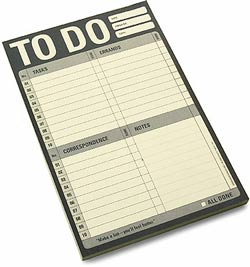
All achievers are tenacious. They stick with a task until it’s complete.
Focus Lists, Suggestions and Rules
Lists help me keep focus.
Focus helps me achieve success.
Lists help me remember everything. Well, everything that I remember to put on my list! I use lists at the grocery store, to help me pack for trips, to stay on task as a writer, and to manage operations.
Not a day goes by that Twitter, Fast Company, Forbes or Harvard Business Review isn’t sharing some list. Examples are:
• The Five Dysfunctions of a Team
• The 21 Irrefutable Laws of Leadership
• Four Rules for Innovative Leadership
• 8 Rules For Creating A Passionate Work Culture
• The Seventeen Indisputable Laws of Teamwork
• 10 Things you should never tell the Boss…mamy more!
The three lists that we suggest you consider creating and working from are considerably less scholarly and personal:
• strategic planning — right things, right people, right reason
• your focus list — short-term … “stepping stones”
• avoid distraction list — your discount, disregards, pay no attention list
Years ago in college a friend’s Dad, Jack, managed very large complex building projects. We were fortunate enough to work summer jobs on some of these projects. These were complicated, multifaceted structures with every trade union involved. Besides managing the timetable, comprehending issues, the myriad of personalities and the network of at times conflicting, rules and ordinances; Jack always had time to teach. One of the many lessons he shared was, “Do the right thing for the right reasons for the right people and you can always get a good night’s sleep, at peace with God.”
Your second list should be a short list of “stepping stones”. Sam Ervin was a U.S. Senator from North Carolina for twenty years. He achieved the national attention when his committee lead the Watergate investigation that lead to Richard Nixon’s resignation. Ervin always referred to himself as a “simple country lawyer.” A distinguished, highly decorated veteran Ervin graduated from the University of North Carolina and Harvard. In a 1975 commencement speech Ervin told the graduates it’s ok to have large dreams, but your to do list needs to be “stepping stones,” the small positive daily strides measured to keep you in the right direction. Graeme McDowell the 2010 US Open winner echoed a similar mantra. “I never dreamed of winning a Ryder Cup or the US Open; I thought about today’s match and what I needed to do tomorrow.”
 Your final list is the Ignore List, dispense with the distractions.
Your final list is the Ignore List, dispense with the distractions.
Most distractions can be avoided by identifying them for what they really are: time wasters. And you can do that by asking yourself one question: is it bringing me closer to or taking me further away from where I need to be? If the answer is the latter then reject it and don’t pay it any more attention.
Accomplishment is a time management issue. The level of accomplishment is in proportion to the amount of time and devotion we give to whatever it is we are working to accomplish. All achievers are tenacious, too. They stick with a task until it’s complete.
Sounds simple, try the three lists:
• strategic planning — right things, right people, right reason
• your focus list — short-term … “stepping stones”
• avoid distraction list — your discount, disregards, pay no attention list

Great article with wisdom passed on from those “who did” as well. Jack sounds like one of those proverbial “giants” whose shoulders we should stand on. Another book foe your list – The 17 Esssential Qualities of a Team Player – Maxwell